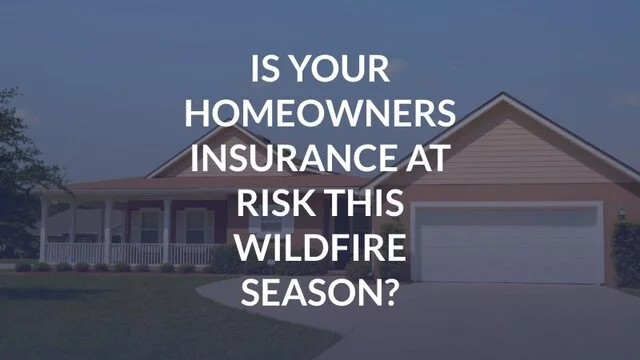
With wildfire activity expected to intensify across the United States this summer, many homeowners in high-risk regions are facing the growing concern of losing their homeowners' insurance. As wildfires become more frequent and severe, insurance companies are reevaluating the risks, and in some cases, choosing to cancel or not renew policies altogether.
If your home is in a wildfire-prone area, it’s essential to understand your rights, your state’s protections, and what steps you can take if your coverage is dropped.
Why Insurers May Drop Your Homeowners Insurance
In most states, insurance companies have the right to cancel a homeowner's policy within the first 60 days for nearly any reason. After that initial period, cancellations typically only occur if you stop paying your premiums, commit fraud, or substantially change your property’s risk profile.
However, when it comes to nonrenewals, which happen at the end of your policy term, insurers have more flexibility. A company may choose not to renew your policy due to factors like a history of claims, changes in business strategy, or increased wildfire risk in your area.
State Laws Offer Some Protection
Insurance companies are generally required to provide written notice before canceling or choosing not to renew a policy. The exact timeline varies by state:
- California mandates at least 75 days’ notice for nonrenewals and 10-20 days for cancellations
- Texas requires 60 days’ notice for nonrenewals and just 10 days for cancellations due to non-payment
- Georgia generally provided 30 days’ notice for both non-renewals and cancellations
Some states have taken additional steps to protect homeowners against cancellations and non-renewals in response to growing wildfire threats. California has enacted a one-year moratorium on cancellations and nonrenewals in areas designated as wildfire disaster zones after the January 2025 wildfires. Homeowners within the ZIP codes protected by the moratorium can request reinstatement if their policy was dropped after the emergency was declared.
In Oregon, state laws prohibit insurers from canceling policies based solely on wildfire risk map data. And Florida has special cancellation waiting periods for homes impacted by hurricanes or windstorms.
To understand what protections apply in your state, the National Association of Insurance Commissioners (NAIC) may have more information.
What Can You Do If You Receive a Cancellation or Nonrenewal Notice?
If your insurer decides not to renew your homeowners policy, there are a few important steps to take:
- Call your insurance company – ask for the reason behind the decision. Sometimes, you may be able to reverse it by agreeing to make certain property improvements.
- Fireproof your property – consider risk-reduction efforts like clearing vegetation, using fire-resistant materials, and removing flammable debris from around your home. These upgrades may help you qualify for coverage with your current or a new insurer.
- Compare coverage options – independent agents and brokers can help you explore new policies, especially those tailored to high-risk homes. Don’t delay, getting new coverage in place before your current policy lapses is crucial.
- Look into state-sponsored plans – if you’re unable to secure traditional coverage, your state may offer a last-resort option through a FAIR (Fair Access to Insurance Requirements) Plan. These programs are available in 33 states, including California, Texas, Georgia, Florida, and North Carolina, and offer limited but vital protection.
Be Proactive Before It’s Too Late
The rising threat of wildfires means that more homeowners could find themselves suddenly without coverage. While insurers have the right to make business decisions based on risk, they must also follow state laws around notice and nonrenewal procedures. Understanding your rights and taking preventative action can help you maintain essential protection for your home.
If your homeowners' insurance was dropped due to wildfire risk and you’re unsure of your next steps, contact the experienced insurance lawyers at Singleton Schreiber today. We can help you understand your legal options and work to protect your rights.
- Partner
Michelle Meyers is a Partner at Singleton Schreiber and is a member of our Fire Litigation, Public Entity Law, Personal Injury and Wrongful Death, Insurance Recovery and Bad Faith practice groups. A seasoned trial and policy holder ...

